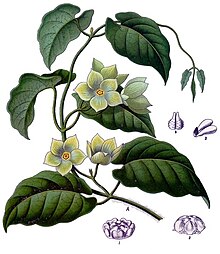| Matelea | |
|---|---|

| |
| Matelea denticulata[2] | |
| Scientific classification | |
| Kingdom: | Plantae |
| Clade: | Tracheophytes |
| Clade: | Angiosperms |
| Clade: | Eudicots |
| Clade: | Asterids |
| Order: | Gentianales |
| Family: | Apocynaceae |
| Subfamily: | Asclepiadoideae |
| Tribe: | Asclepiadeae |
| Genus: | Matelea Aubl.[1] |
| Synonyms[3] | |
| |
Matelea is a genus of flowering plants in the family Apocynaceae. It contains about 200 species, which are commonly known as milkvines.[4] Some people consider Chthamalia to be a synonym to or a subgenus of Matelea.[5]
- ^ "Genus: Matelea Aubl". Germplasm Resources Information Network. United States Department of Agriculture. 2003-03-13. Archived from the original on 2009-05-06. Retrieved 2011-01-27.
- ^ 1897 illustration from Franz Eugen Köhler, Köhler's Medizinal-Pflanzen
- ^ [https://powo.science.kew.org/taxon/urn:lsid:ipni.org:names:30001048-2 Matelea Aubl. Plants of the World Online. Retrieved 25 October 2023.
- ^ "Matelea". Integrated Taxonomic Information System. Retrieved 2011-01-27.
- ^ Woodson, Robert E. (1941). "The North American Asclepiadaceae. I. Perspective of the Genera". Annals of the Missouri Botanical Garden. 28 (2): 193–244. doi:10.2307/2394270. JSTOR 2394270.